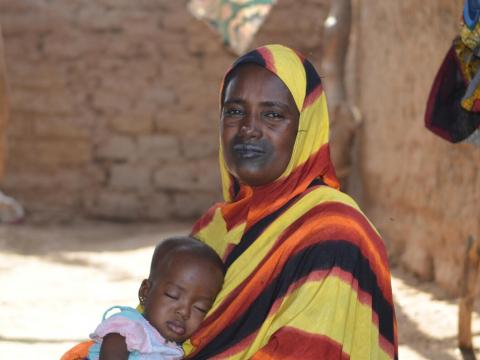Little Mariam needs more than what her mother can give

By Joelma Pereira - Communications Manager, World Vision in Mali
A deadly mix of conflict, climate change, and the socio-economic impacts of COVID-19 is increasing hunger and malnutrition across the globe. In Mali, UNICEF’s Humanitarian Appeal Situation Report on January 2021 estimated that over 188,000 children are at risk of severe and acute malnutrition.
In this country, conflict and the COVID-19 pandemic have been the main drivers for food insecurity and malnutrition among children under five. In the Mopti region, thousands of internally displaced families live in fear, and face serious food shortages without hope for a better future.
The family of Ada Diallo (35), a mother of two little girls from a village five kilometres from Sevare, is living evidence of how conflict left her family with no means to feed her children adequately.
“My one-year-old daughter, Mariam, is suffering from severe malnutrition”, shares Ada. “After Mariam fell ill two months ago, I decided to take her to the local health post. At the health post, the doctor told me that she is suffering from severe malnutrition. After the consultation, he gave me a special food made of peanut paste for her.”
Ada’s youngest daughter received a Ready-to-Use Therapeutic Food (RUTF) called Plumpy'Nut, made of peanut paste for the treatment of severe and acute malnutrition. The little one shows visible signs of malnutrition - tiredness, and irritability - while seating in her mother's lap.
When Ada first took little Mariam to the health post back in March 2021, a nutrition screening done by the medical staff determined that she was suffering from severe malnutrition. As a result, Mariam has been receiving treatment since March 2021. Since then, mother and daughter were asked to make weekly visits to the health post for doctors to check on Mariam’s progress.
“She is always sleeping and she cries a lot”, Ada tells me, looking in despair. “Sometimes she refuses breast milk. When that happens I really, do not know what to do.”
On top of all this, Ada has been battling a chronic skin disease for over a year now.
“I tried many treatments, but none has cured my illness”, she shares, showing me visible marks on her arms. “As you can see, my upper lip is swollen. Sometimes my whole body swells. When this happens the pain and fever are unbearable.”
The mother of two girls explains that the illness represents a big handicap for her. As a second wife, there are a lot of house responsibilities that she cannot undertake anymore. As a result, Ada’s illness contributes negatively to her daily family life and affects her position in the family.
“Today it's difficult, for me to go to the bush to fetch cooking wood, because it is no longer safe”, she says. “My husband lost the whole of the livestock we had, and he cannot go to the field to look for them.”
Since the beginning of the inter-community conflict, men like Ada’s husband – farmers or cattle breeders- have been the main target of the armed group still active in the surrounding areas. Many have lost their lives while farming or while pasturing their flocks.
Unfortunately, in this region, even though several peace agreements between the two communities have been signed in the past three months, target attacks, violence, and persecution continue.
Even though Ada’s, husband is alive and well, both of them confessed to us that they only feel safe when they are at home in the village or when they are surrounded by locals. All this makes it difficult for Ada’s family to have hope for a better future.
Despite, the fact that Ada’s, family recently received support from World Vision (food-for-asset initiative undertaken as part of a resilience project), with a household of 21 people, they are finding it difficult to feed all the members.
“Recently, my husband received money from working in a small vegetable garden World Vision gave us, but the quantity of vegetables we harvest from the garden only lasted for a week”, shares Ada. “My husband bought four bags of rice with the money he received. Unfortunately, with a family of 21 members, this food will not last for long.”
Ada further adds: “The girls are not very keen on eating rice only, so sometimes they cry the whole day for food and that makes me feel powerless.”

As I left the family, I could not help wondering what one could possibly say to hopeless mothers like Ada. On the other hand, I have the conviction that urgent action is needed, to provide a long-term solution to the cyclical and chronic food insecurity in Mali due to conflict.